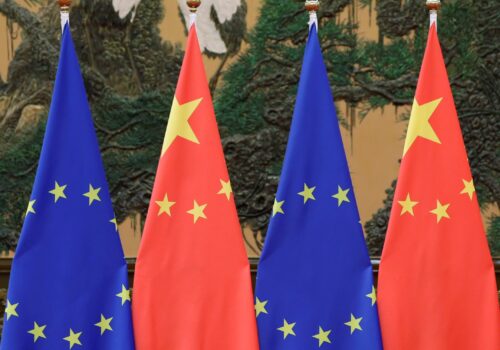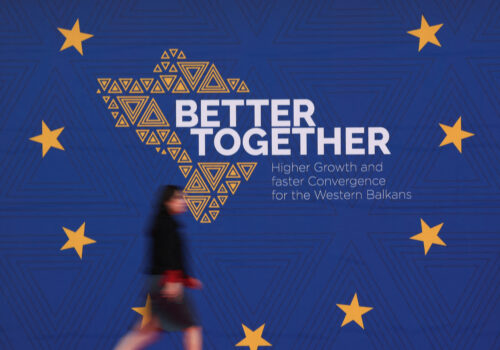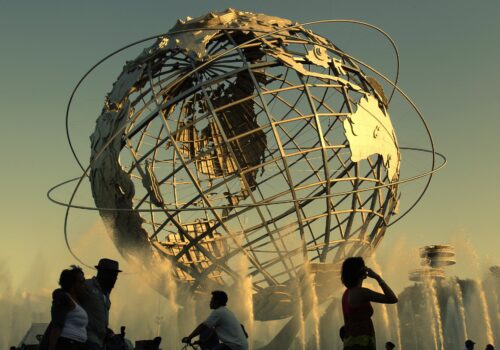Realizing a bolder transatlantic agenda for cooperation with Africa
This essay is part of the report “Transatlantic horizons: A collaborative US-EU policy agenda for 2025 and beyond,” which outlines an agenda for common action for the next US administration and European Commission.
The bottom line
In recent years, weak transatlantic cooperation between Europe and the United States has led to a spectacular setback of Western influence in Africa, benefiting not only China and Russia but also middle powers. Innovative recent initiatives could nevertheless be a beginning in the revitalization of cooperation between the United States and the European Union (EU) in Africa. The success of this cooperation, however, depends on a better understanding of African needs and a greater inclusion of Africans in global governance.
State of play
Despite what the United States and the EU do in Africa, their cooperation on policy toward the continent is rather limited. The United States and the EU each have individual priorities in Africa, including in their recent infrastructure development pushes, both bilaterally and at the multilateral level. For example, the Group of Seven’s (G7’s) Partnership for Global Infrastructure and Investment, launched in 2022, seeks to mobilize $600 billion into sustainable infrastructure investment in the Global South by 2027.
Yet, the last time the EU and the United States specifically mentioned their cooperation in Africa, it was a relatively short, four-sentence section in the “US-EU Summit Joint Statement” in October 2023: “The United States and the European Union share a common interest in a thriving, peaceful, democratic, and resilient Africa, and welcome the accession of the African Union as a permanent member of the G20. We will work together to continue to enhance synergies in our cooperation with all our African partners. We are committed to promoting the security, stability and prosperity of North Africa. We reaffirm our commitment to tackle common security challenges in the Sahel, including the fight against terrorism, in cooperation with ECOWAS.”
Other than the mention of the Group of Twenty permanent seat achieved a month earlier, this statement could have been released twenty or thirty years ago. It does not capture the African momentum reflected in the youth boom—one in four people on Earth will be African in twenty-five years—the digital and artificial intelligence revolution, the emerging markets, the climate and energy stakes, the business environment, and the strong African appetite for greater independence.
The strategic imperative
From the Western perspective, the lack of cooperation with the African continent risks missing the major challenge: how to join US-EU forces to compete more efficiently with global powers such as China and Russia, as well as the growing role of middle powers such as those in the Middle East, Brazil, and India. The former seek to challenge the West’s dominance on the global stage and the rules they champion, while the latter look to grow their own wealth and diplomatic influence in an increasingly multilateral world.
Africa is a strategic element of these powers’ growing influence. The largest trading partners of Africa, after the European Union, are China, India, the United States, and the United Arab Emirates, in that order. At the same time, the BRICS—a group that includes founding members Brazil, Russia, India, China, and South Africa—is expanding. In 2024, the bloc welcomed six new countries as members, including Egypt and Ethiopia. The group now represents a third of the world’s wealth, as measured by purchasing power parity, and 46 percent of the world’s population. The widening of the group’s membership and depth of cooperation matters. Their major ambitions include building an alternative multilateralism, starting with granting 30 percent of their new development bank’s loans in local currency, rather than in US dollars or euros, and without conditions. With more affordable loans and no conditions such as democratic improvement, these grants may be attractive for African regimes that prefer not to provide explanations about their governance.
Africa matters for Washington and Brussels on security as well. Russia is the largest provider of weapons in Africa. Moscow uses its influence on the continent as a key resource for its war in Ukraine in both the use of natural resources for its war effort and its propaganda campaign justifying its full-scale invasion. Beijing, too, leverages its relationships on the continent to its advantage. This strategy has been fruitful. Moscow and Beijing have been able to leverage African nations’ 30 percent share of votes in the United Nations to undermine Ukraine’s—and the United States and the EU’s—efforts to rally a global coalition against Russia. Most African countries refused to support sanctions against Russia, and only one African country, Eswatini, currently recognizes Taiwan.
The stakes are high for the West, both geopolitically and economically. As the West tries to reduce its dependence on China, Africa, which holds 30 percent of the world’s critical mineral reserves, is crucial. In a market where the demand for minerals essential to electric vehicles and defense technology—such as lithium, cobalt, and copper—could increase almost fourfold by 2030, good relations with Africa will be critical for the EU and the United States’ de-risking efforts.
Policy recommendations
In the next four years, the EU and the United States will have to assert their respective Africa policies on a much larger scale to address these major shifts and embrace new opportunities on the continent. Substantial conditions are required:
- More coordination: Instead of being launched separately, many projects offer an opportunity for the United States and the EU—and its members—to join forces. The Partnership for Atlantic Cooperation announced in September 2023, with its thirty-nine member countries, could include the leading European Atlantic power, France. As for the EU’s Global Gateway, this investment project in fiber, green energy, health, energy, and transport, launched in 2021, should be better coordinated with the United States’ own effort launched in the same year as part of the G7’s PGII. Given the growing importance of youth, the Africa-Europe Youth Academy mirrors similar initiatives by the US government such as the Young African Leaders Initiative and Mandela Washington Fellowship and could be merged or at least coordinated.
- More consistency: Competition with China in the market for critical minerals must not come at the expense of Africa’s development needs. The prioritization of value and job creation in Africa—so critical for decreasing migration flows to the north and the EU—should be a comparative advantage for the United States and the EU at a time when China is forced to reduce its spending on the continent and when Africans are increasingly aware of the need to limit their national debt levels and protect their national interests. However, the Western approach still does not prioritize Africa’s development enough. According to some observers, for example, the Lobito Corridor project, launched in September 2023 under the PGII with participation from Washington and Brussels, did not distance itself enough from an extractive approach. Even worse, as far as the EU is concerned, is the continuation of an outdated strategy that flies in the face of the basic principles of human rights it is supposed to promote, as demonstrated by the surprising agreement on strategic minerals signed with Rwanda in February 2024.
- More ambition: The West also has a tool its competitors do not yet have that could be a game changer for Africans’ lives: the financing of African economies. The youngest continent needs many millions of new jobs generated per year, yet it only creates three million. Investment is prohibitively challenging in Africa not because governments spend too much (the fifty-five African countries spent only $60 billion on COVID-19 relief, for example, while European countries spent $4.2 trillion and the United States $5.8 trillion) or because they do not perform economically (they have six of the ten fastest-growing economies in the world in 2024), but because the cost of borrowing is much higher than elsewhere (four times higher than in the United States and nearly eight times higher than in Germany). With 80 percent of Africa’s debt denominated in dollars, a reform of the international financial system would release investment in Africa and offer the West a real opportunity to compete with China. The United States and the EU can work together with African countries to make progress on reforms addressing these structural issues.
- More inclusivity: Instead of remaining on the defensive, the United States and European nations could regain “moral” leadership by taking the initiative in systemic reform that would reshuffle the cards and challenge China and Russia to turn their promises to Africans into actions and test their sincerity to the Africans they claim to defend. A coordinated strategy to include two African countries in the United Nations Security Council as permanent members, building on Washington’s support for such a move, will help debunk China and Russia’s hypocrisy when it comes to Africa’s inclusion in this forum.
Rama Yade is the senior director of the Atlantic Council’s Africa Center. She was formerly the French deputy minister of sports and also served as the ambassador of France to the United Nations Educational, Scientific and Cultural Organization (UNESCO).
read more essays

The Europe Center promotes leadership, strategies, and analysis to ensure a strong, ambitious, and forward-looking transatlantic relationship.
Image: Workers plant flowers under the newly constructed Nairobi expressway in Nairobi, Kenya, February 8, 2022. REUTERS/Baz Ratner TPX IMAGES OF THE DAY.


